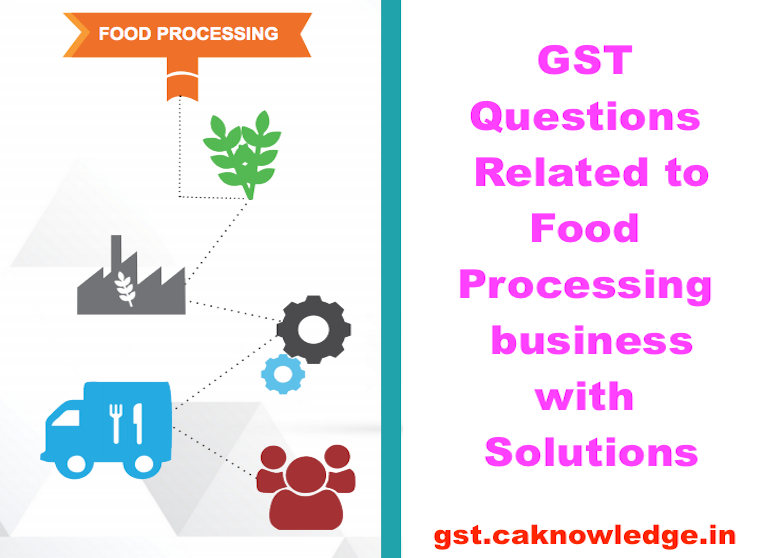(i) Will I have to get myself registered now? Answer: Rice put in a unit container and bearing a registered brand name is taxable @ 5%. In accordance with the provisions of section 22 of the CGSTAct, 2017 (applicable in your case), a person becomes liable to be registered in the State/UT from where he makes taxable supply of goods or services or both if his aggregate turnover (which includes value of exempt supplies as well) in a financial year exceeds Rs.20 Lakh. Hence, liability to get registration accrues in your case from the date the aggregate turnover in the current financial year exceeds Rs.20 lakh. (ii) The suppliers of basmati rice (branded) are saying that they will charge 5% IGST and I must get myself registered to avail the ITC. What do I do? Answer: As rice put up in a unit container and bearing a registered brand name is taxable @ 5%, the suppliers of branded basmati rice located in other States would be charging IGST @ 5%, whose credit can be availed only when the recipient is registered under the CGST Act, 2017.Therefore, if you want to avail of input tax credit, you must get yourself registered. That said, for making interState purchases one is not mandatorily required to be registered. (iii) 90% of my turnover will of un-branded rice, while 10% only will of branded one. Can I sell both of them in one invoice? Answer: As per Invoice Rules, a registered person supplying taxable goods is required to issue a tax invoice and in case of exempted goods, he is required to issue a bill of supply. As all the contents of bill of supply are included in the tax invoice, a separate bill of supply need not be issued in case of the exempt component. Thus, both branded and unbranded rice can be included in one invoice. (iv) As an un-registered taxable person now, am I required to furnish information like HSN, place of supply, taxable value, etc in my invoice? (I know that it is mandatory for a tax invoice only). Answer: HSN codes, taxable value, place of supply are required to be recorded in a tax invoice to be issued by a registered person under rule 46 of the CGST Rules, 2017. An unregistered person cannot issue a tax invoice. (v) Assuming, I apply for voluntary registration and obtain GST registration: Question 10: Caterpillar is a restaurant cum bar in Kolkata. It has successfully migrated to GST. While the first floor area of the restaurant is air conditioned and supplies food as well as liquor, the ground floor serves only food and is non-air-conditioned. Caterpillar wants to know,: (i) Whether they will charge GST @ 12% on supplies made from ground floor or 18%? Answer: Tax will have to be charged @ 18% irrespective of from where the supply is made, first floor or second floor. If any part of the establishment has a facility of air conditioning then the rate will be 18% for all supplies from the restaurant. (ii) Whether they can raise one tax invoice for both food and liquor or not? Answer: Tax invoice has to be issued for supply of food, while for liquor a bill of supply has to be issued or any invoice as may be required under the provisions of local VAT or sales tax law of the concerned State. (iii) What will the rate of tax to be charged for supplies of food made from their takeaway counter? Answer: Tax has to be charged @18% on supplies of food made from their takeaway counter. (iv) Can they claim ITC of CGST and SGST paid on crockery items to be used in the restaurant? Answer: Yes, they can claim ITC of CGST and SGST paid on crockery items to be used in the restaurant. It may be stated that they are entitled to the credit of even IGST paid where such goods are procured from outside the State against a tax invoice. (v) Whether they will be eligible for ITC on crockery items purchased locally in the month of March, 2017 paying VAT of Rs.72,500/-. The goods have been shown as business assets. Answer:If the State VAT law allowed ITC on such goods, the credit was available on the date of purchase.Section 140(1) of the SGST Act, 2017 allows them to carry forward the credit on account of VAT. (vi) Whether they can opt for composition (last year their turnover was more than rupees one Crore)? Answer: No. they are not eligible for composition levy as they are also supplying liquor. vii) Can they issue separate series of tax invoices for their supplies from first floor, ground floor and takeaway counter? Answer: In accordance with the provisions of Rule 46(b) of the CGST Rules, 2017 the tax invoice need to be serially numbered not exceeding sixteen characters, in one or multiple series. As such, they can issue different series of tax invoices as stated but it must conform to the requirements as given in the said rule. Note: Reference to CGST Act, 2017 includes reference to SGST Act, 2017 and UTGST Act, 2017 also. Recommended Articles
